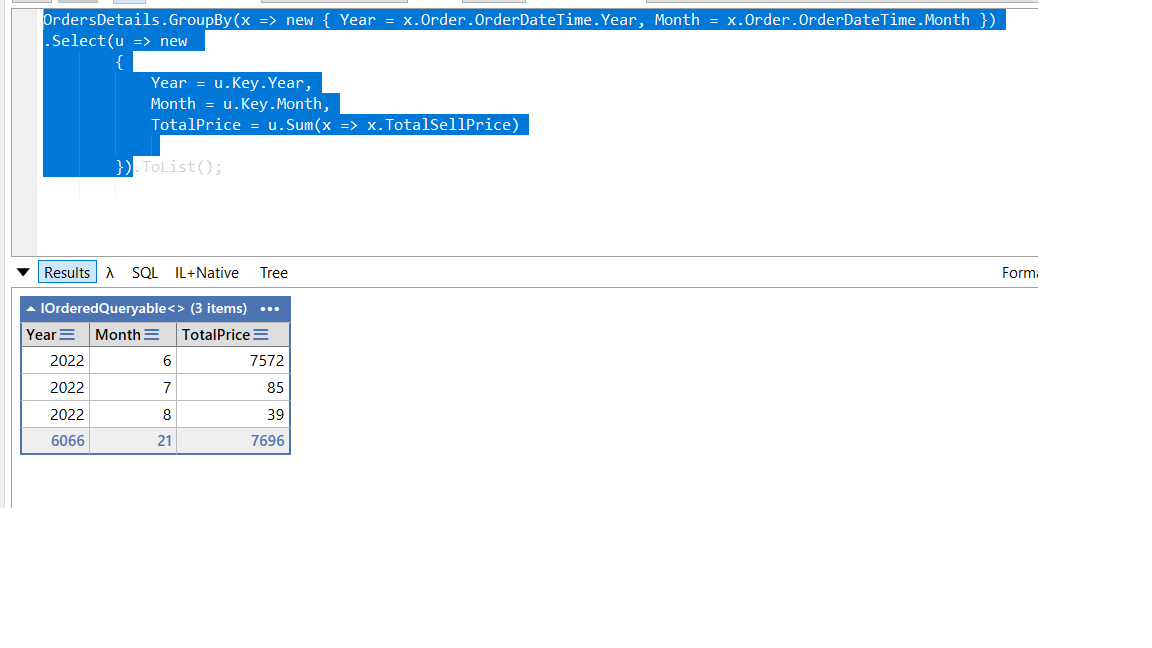I ran the query without any errors on LinqPad, but I couldn't fetch the data as requested.
OrdersDetails.GroupBy(x => new { Year = x.Order.OrderDateTime.Year, Month = x.Order.OrderDateTime.Month })
.Select(u => new
{
Year = u.Key.Year,
Month = u.Key.Month,
TotalPrice = u.Sum(x => x.TotalSellPrice)
})

I have Order, OrderDetail, and Vendor entities. How can I obtain annual, last 3 months' total sales data, and a total number of orders data on a vendor basis from the entities consisting of these sample data? I tried but I'm not very familiar with Linq. By the way, I am using EF Core 6.
I got an invalid anonymous type member when I try to implement linq on the dotnetfiddle.
using System;
using System.Linq;
using System.Collections.Generic;
public class Program
{
public static void Main()
{
// Order collection
IList<Order> orderList = new List<Order>() {
new Order() { Id = 1, OrderDateTime = new DateTime(2019, 11, 12, 22, 45, 12, 004), CustomerName = "ABC", Status = "Completed",DoneBy="Cenk"} ,
new Order() { Id = 2, OrderDateTime = new DateTime(2019, 11, 12, 22, 45, 12, 004), CustomerName = "A", Status = "Ccancelled",DoneBy="Cenk" } ,
new Order() { Id = 3, OrderDateTime = new DateTime(2022, 07, 12, 22, 45, 12, 004), CustomerName = "dsds", Status = "Contiues",DoneBy="Cenk" } ,
new Order() { Id = 4, OrderDateTime = new DateTime(2022, 08, 12, 22, 45, 12, 004) , CustomerName = "dsds", Status = "Completed",DoneBy="Cenk"} ,
new Order() { Id = 5, OrderDateTime = new DateTime(2022, 09, 12, 22, 45, 12, 004) , CustomerName = "jdsj",Status = "Completed",DoneBy="Cenk" }
};
// OrderDetail collection
IList<OrderDetail> orderDetailList = new List<OrderDetail>() {
new OrderDetail() { Id = 1, ProductCode = "12345", ProductName = "modem1",BuyQuantity=1,SellQuantity=10,CostRatio=2 , UnitCost=5,TotalBuyPrice=10,TotalSellPrice=15,Status = "Completed",ShippingNumber="Cenk", TrackingNumber="72827", Description="Test", OrderId=1, VendorId=1} ,
new OrderDetail() { Id = 2, ProductCode = "Erf7899", ProductName = "modem2",BuyQuantity=2,SellQuantity=10,CostRatio=2 , UnitCost=5,TotalBuyPrice=10,TotalSellPrice=15,Status = "Contiunes",ShippingNumber="Cenk", TrackingNumber="72827", Description="Test", OrderId=1, VendorId=1 } ,
new OrderDetail() { Id = 3, ProductCode = "0090owd", ProductName = "modem3",BuyQuantity=10,SellQuantity=15,CostRatio=2 , UnitCost=1,TotalBuyPrice=10,TotalSellPrice=15,Status = "Completed",ShippingNumber="Cenk", TrackingNumber="72827", Description="Test", OrderId=1, VendorId=1 } ,
new OrderDetail() { Id = 4, ProductCode = "fse929", ProductName = "modem4",BuyQuantity=11,SellQuantity=15,CostRatio=2 , UnitCost=5,TotalBuyPrice=10,TotalSellPrice=15,Status = "Cancelled",ShippingNumber="Cenk", TrackingNumber="72827", Description="Test", OrderId=1, VendorId=2} ,
new OrderDetail() { Id = 5, ProductCode = "1009ksks", ProductName = "modem5",BuyQuantity=19,SellQuantity=1,CostRatio=2 , UnitCost=1,TotalBuyPrice=10,TotalSellPrice=15,Status = "Completed",ShippingNumber="Cenk", TrackingNumber="72827", Description="Test", OrderId=1, VendorId=1 },
new OrderDetail() { Id = 6, ProductCode = "556dhdk", ProductName = "modem6",BuyQuantity=9,SellQuantity=13,CostRatio=2 , UnitCost=5,TotalBuyPrice=10,TotalSellPrice=15,Status = "Completed",ShippingNumber="Cenk", TrackingNumber="72827", Description="Test", OrderId=1, VendorId=2 } ,
new OrderDetail() { Id = 7, ProductCode = "99999", ProductName = "modem7",BuyQuantity=10,SellQuantity=14,CostRatio=2 , UnitCost=15,TotalBuyPrice=10,TotalSellPrice=15,Status = "Completed",ShippingNumber="Cenk", TrackingNumber="72827", Description="Test", OrderId=1, VendorId=2 },
new OrderDetail() { Id = 8, ProductCode = "00000", ProductName = "modem8",BuyQuantity=1,SellQuantity=15,CostRatio=2 , UnitCost=1,TotalBuyPrice=10,TotalSellPrice=15,Status = "Completed",ShippingNumber="Cenk", TrackingNumber="72827", Description="Test", OrderId=1, VendorId=1 }
};
// vendor collection
IList<Vendor> vendorList = new List<Vendor>() {
new Vendor() { Id = 1, Name = "Vendor1", Address = "ABC Address", Email = "Email", PhoneNumber="1234353", MainResponsibleName="test", AssistantResponsibleName="test1"} ,
new Vendor() { Id = 2, Name = "Vendor1", Address = "ABC Address", Email = "Email", PhoneNumber="1234353", MainResponsibleName="test", AssistantResponsibleName="test1" }
};
var data = orderList
.Select(o => new { o.OrderDateTime.Year, o.OrderDateTime.Month, o.OrderDetails.Sum(d => d.TotalSellPrice)})
.GroupBy(x => new { x.Year, x.Month }, (key, group) => new
{
yr = key.Year,
mnth = key.Month,
Price = group.Sum(k => k.TotalSellprice)
}).ToList();
}
}
public class Order
{
public int Id { get; set; }
public DateTime OrderDateTime { get; set; }
public string CustomerName { get; set; }
public string Status { get; set; }
public string DoneBy { get; set; }
public List<OrderDetail> OrderDetails { get; set; }
}
public class OrderDetail
{
public int Id { get; set; }
public string ProductCode { get; set; }
public string ProductName { get; set; }
public int BuyQuantity { get; set; }
public int SellQuantity { get; set; }
public double CostRatio { get; set; }
public double UnitCost { get; set; }
public double TotalBuyPrice { get; set; }
public double TotalSellPrice { get; set; }
public string ShippingNumber { get; set; }
public string Status { get; set; }
public string TrackingNumber { get; set; }
public string Description { get; set; }
public string Currency { get; set; }
public int OrderId { get; set; }
public int VendorId { get; set; }
public Order Order { get; set; }
public Vendor Vendor { get; set; }
}
public class Vendor
{
public int Id { get; set; }
public string Name { get; set; }
public string Address { get; set; }
public string Email { get; set; }
public string PhoneNumber { get; set; }
public string MainResponsibleName { get; set; }
public string AssistantResponsibleName { get; set; }
public List<OrderDetail> OrderDetails { get; set; }
}
Edit 1
I ran the query without any errors on LinqPad, but I couldn't fetch the data as requested.
OrdersDetails.GroupBy(x => new { Year = x.Order.OrderDateTime.Year, Month = x.Order.OrderDateTime.Month })
.Select(u => new
{
Year = u.Key.Year,
Month = u.Key.Month,
TotalPrice = u.Sum(x => x.TotalSellPrice)
})
enter image description here
Sample data
SET IDENTITY_INSERT [dbo].[Orders] ON
INSERT INTO [dbo].[Orders] ([Id], [OrderDateTime], [CustomerName], [Status], [DoneBy]) VALUES (1, N'2022-06-07 16:46:21', N'customer1', N'Completed', N'test1111')
INSERT INTO [dbo].[Orders] ([Id], [OrderDateTime], [CustomerName], [Status], [DoneBy]) VALUES (2, N'2022-06-08 00:00:00', N'Vestel', N'Continues', N'Cenk')
INSERT INTO [dbo].[Orders] ([Id], [OrderDateTime], [CustomerName], [Status], [DoneBy]) VALUES (3, N'2022-07-09 00:00:00', N'Arçelik', N'Cancelled', N'Cavit')
INSERT INTO [dbo].[Orders] ([Id], [OrderDateTime], [CustomerName], [Status], [DoneBy]) VALUES (4, N'2022-08-08 23:31:59', N'Fener', N'Continues', N'Test')
INSERT INTO [dbo].[Orders] ([Id], [OrderDateTime], [CustomerName], [Status], [DoneBy]) VALUES (5, N'2022-08-08 23:37:54', N'Ümraniye', N'Continues', N'Ümraniye')
INSERT INTO [dbo].[Orders] ([Id], [OrderDateTime], [CustomerName], [Status], [DoneBy]) VALUES (6, N'2021-08-04 23:43:28', N'Bruma', N'Completed', N'Gustova')
INSERT INTO [dbo].[Orders] ([Id], [OrderDateTime], [CustomerName], [Status], [DoneBy]) VALUES (7, N'2021-09-09 13:16:36', N'Custom', N'Completed', N'Test')
INSERT INTO [dbo].[Orders] ([Id], [OrderDateTime], [CustomerName], [Status], [DoneBy]) VALUES (8, N'2022-08-09 13:21:14', N'Tsubasa', N'Continues', N'Employee')
INSERT INTO [dbo].[Orders] ([Id], [OrderDateTime], [CustomerName], [Status], [DoneBy]) VALUES (9, N'2021-10-27 13:37:36', N'New Customer', N'Completed', N'Test')
SET IDENTITY_INSERT [dbo].[Orders] OFF
SET IDENTITY_INSERT [dbo].[OrdersDetail] ON
INSERT INTO [dbo].[OrdersDetail] ([Id], [ProductCode], [ProductName], [BuyQuantity], [SellQuantity], [CostRatio], [UnitCost], [TotalBuyPrice], [TotalSellPrice], [ShippingNumber], [Status], [TrackingNumber], [Description], [OrderId], [VendorId], [Currency]) VALUES (4, N'1', N'r', 12, 34, 2, 0, 56, 4, N'shipment', N'Completed', N'001', N'desc', 1, 2, N'TL')
INSERT INTO [dbo].[OrdersDetail] ([Id], [ProductCode], [ProductName], [BuyQuantity], [SellQuantity], [CostRatio], [UnitCost], [TotalBuyPrice], [TotalSellPrice], [ShippingNumber], [Status], [TrackingNumber], [Description], [OrderId], [VendorId], [Currency]) VALUES (5, N'12345-ABCN', N'Ipad', 5, 5, 10, 1000, 1000, 1500, N'S1', N'Getting ready', N'T11111', N'description1', 2, 1, N'TL')
INSERT INTO [dbo].[OrdersDetail] ([Id], [ProductCode], [ProductName], [BuyQuantity], [SellQuantity], [CostRatio], [UnitCost], [TotalBuyPrice], [TotalSellPrice], [ShippingNumber], [Status], [TrackingNumber], [Description], [OrderId], [VendorId], [Currency]) VALUES (6, N'0000-DDDD', N'Modem', 6, 6, 15, 200, 150, 225, N'S2', N'Getting ready', N'T11112', N'description2', 2, 2, N'TL')
INSERT INTO [dbo].[OrdersDetail] ([Id], [ProductCode], [ProductName], [BuyQuantity], [SellQuantity], [CostRatio], [UnitCost], [TotalBuyPrice], [TotalSellPrice], [ShippingNumber], [Status], [TrackingNumber], [Description], [OrderId], [VendorId], [Currency]) VALUES (7, N'98937-OPSKJ', N'ZTE', 7, 7, 10, 5000, 4500, 5500, N'S3', N'Getting ready', N'T11113', N'description3', 2, 1, N'TL')
INSERT INTO [dbo].[OrdersDetail] ([Id], [ProductCode], [ProductName], [BuyQuantity], [SellQuantity], [CostRatio], [UnitCost], [TotalBuyPrice], [TotalSellPrice], [ShippingNumber], [Status], [TrackingNumber], [Description], [OrderId], [VendorId], [Currency]) VALUES (8, N'11111-YUSH', N'Laptop', 8, 8, 6, 50, 50, 75, N'S4', N'Cancelled', N'T11114', N'description1', 3, 2, N'Dolar')
INSERT INTO [dbo].[OrdersDetail] ([Id], [ProductCode], [ProductName], [BuyQuantity], [SellQuantity], [CostRatio], [UnitCost], [TotalBuyPrice], [TotalSellPrice], [ShippingNumber], [Status], [TrackingNumber], [Description], [OrderId], [VendorId], [Currency]) VALUES (9, N'0090', N'Knife', 20, 677, 40, 0, 700, 343, N'9202930', N'Completed', N'ueı9q9u', N'test', 1, 2, N'Euro')
INSERT INTO [dbo].[OrdersDetail] ([Id], [ProductCode], [ProductName], [BuyQuantity], [SellQuantity], [CostRatio], [UnitCost], [TotalBuyPrice], [TotalSellPrice], [ShippingNumber], [Status], [TrackingNumber], [Description], [OrderId], [VendorId], [Currency]) VALUES (10, N'4', N'mouse', 12, 10, 10, 0, 10, 10, N's', N'Cancelled', N't', N'd', 3, 1, N'Euro')
INSERT INTO [dbo].[OrdersDetail] ([Id], [ProductCode], [ProductName], [BuyQuantity], [SellQuantity], [CostRatio], [UnitCost], [TotalBuyPrice], [TotalSellPrice], [ShippingNumber], [Status], [TrackingNumber], [Description], [OrderId], [VendorId], [Currency]) VALUES (11, N'rrrrrrrr', N'tank palet', 100, 8878, 40, 0, 288, 39, N'trk*0292', N'Getting ready', N'79ıwowu998', N'desc', 4, 1, N'Dolar')
SET IDENTITY_INSERT [dbo].[OrdersDetail] OFF




